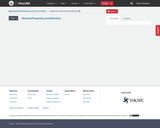
303 Results

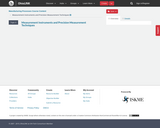
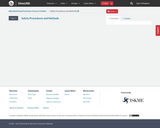
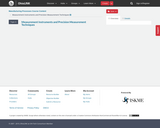
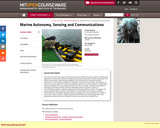
This course covers basic topics in autonomous marine vehicles, focusing mainly on software and algorithms for autonomous decision making (autonomy) by underwater vehicles operating in the ocean environments, autonomously adapting to the environment for improved sensing performance. It will introduce students to underwater acoustic communication environment, as well as the various options for undersea navigation, both crucial to the operation of collaborative undersea networks for environmental sensing. Sensors for acoustic, biological and chemical sensing by underwater vehicles and their integration with the autonomy system for environmentally adaptive undersea mapping and observation will be covered. The subject will have a significant lab component, involving the use of the MOOS-IvP autonomy software infrastructure for developing integrated sensing, modeling and control solutions for a variety of ocean observation problems, using simulation environments and a field testbed with small autonomous surface craft and underwater vehicles operated on the Charles River.
- Subject:
- Applied Science
- Engineering
- Environmental Science
- Material Type:
- Full Course
- Provider:
- M.I.T.
- Provider Set:
- M.I.T. OpenCourseWare
- Author:
- Henrik Schmidt
- Michael Benjamin
- Date Added:
- 01/01/2012
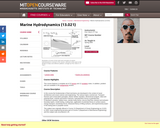
In this course the fundamentals of fluid mechanics are developed in the context of naval architecture and ocean science and engineering. The various topics covered are: Transport theorem and conservation principles, Navier-Stokes' equation, dimensional analysis, ideal and potential flows, vorticity and Kelvin's theorem, hydrodynamic forces in potential flow, D'Alembert's paradox, added-mass, slender-body theory, viscous-fluid flow, laminar and turbulent boundary layers, model testing, scaling laws, application of potential theory to surface waves, energy transport, wave/body forces, linearized theory of lifting surfaces, and experimental project in the towing tank or propeller tunnel.
- Subject:
- Applied Science
- Architecture and Design
- Engineering
- Material Type:
- Full Course
- Provider:
- M.I.T.
- Provider Set:
- M.I.T. OpenCourseWare
- Author:
- Yue, Dick
- Date Added:
- 01/01/2005
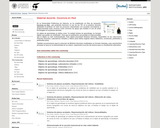
Polytechnic University of Valencia has established an Action Plan, Teaching Network (Docencia en red), which aims to promote the use of ICT in teaching, supporting the teacher in all processes related to innovative actions and providing both resources and services support to facilitate the use of these technologies in teaching. This plan is structured through annual calls for proposals (2018-2019 Call) .
The purpose of this call is to encourage teachers at the Universitat Politècnica de València to produce during the academic year 2018-2019 ("and in all previous calls") educational materials destined to enhance the repository of digital learning objects RiuNet, to stimulate the use of learning modules in UPV subjects, to enrich the collection of freely accessible materials.
All materials elaborated have to meet the criteria set out in the guidelines for the creation of learning materials (http://www.upv.es/contenidos/DOCENRED/infoweb/docenred/info/710371normalc.html).
In order to guarantee the quality of the materials presented to the plan, the UPV centres, through the Learning Object Groups, will value the materials produced, with quality indicators. The approval of the objects for publication will be carried out by the Commission of the Network Teaching Plan.
All OER are accessible through the institutional repository Riunet, through OAI-PMH they can be harvested by other information resources (e.g. BASE, etc.). They are described with Dublin Core and DC.LOM metadata.
Best regards
- Subject:
- Applied Science
- Arts and Humanities
- Computer Science
- Engineering
- Environmental Science
- Social Science
- Material Type:
- Activity/Lab
- Assessment
- Interactive
- Simulation
- Author:
- Universitat Politècnica de València
- Date Added:
- 04/02/2020
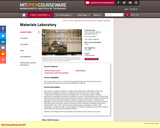
This course is a required sophomore subject in the Department of Materials Science and Engineering, designed to be taken in conjunction with the core lecture subject 3.012 Fundamentals of Materials Science and Engineering. The laboratory subject combines experiments illustrating the principles of quantum mechanics, thermodynamics and structure with intensive oral and written technical communication practice. Specific topics include: experimental exploration of the connections between energetics, bonding and structure of materials, and application of these principles in instruments for materials characterization; demonstration of the wave-like nature of electrons; hands-on experience with techniques to quantify energy (DSC), bonding (XPS, AES, FTIR, UV/vis and force spectroscopy), and degree of order (x-ray scattering) in condensed matter; and investigation of structural transitions and structure-property relationships through practical materials examples.
- Subject:
- Engineering
- Material Type:
- Full Course
- Provider:
- M.I.T.
- Provider Set:
- M.I.T. OpenCourseWare
- Author:
- Stellacci, Francesco
- Date Added:
- 01/01/2006
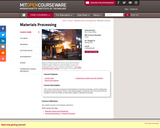
The goal of 3.044 is to teach cost-effective and sustainable production of solid material with a desired geometry, structure or distribution of structures, and production volume. Toward this end, it is organized around different types of phase transformations which determine the structure in various processes for making materials, in roughly increasing order of entropy change during those transformations: solid heat treatment, liquid-solid processing, fluid behavior, deformation processing, and vapor-solid processing. The course ends with several lectures that place the subject in the context of society at large.
- Subject:
- Engineering
- Material Type:
- Full Course
- Provider:
- M.I.T.
- Provider Set:
- M.I.T. OpenCourseWare
- Author:
- Schuh, Chris
- Date Added:
- 01/01/2013
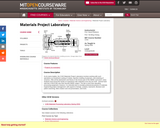
As its name implies, the 3.042 Materials Project Laboratory involves working with such operations as investment casting of metals, injection molding of polymers, and sintering of ceramics. After all the abstraction and theory in the lecture part of the DMSE curriculum, many students have found this hands-on experience with materials to be very fun stuff - several have said that 3.042/3.082 was their favorite DMSE subject. The lab is more than operating processing equipment, however. It is intended also to emulate professional practice in materials engineering project management, with aspects of design, analysis, teamwork, literature and patent searching, web creation and oral presentation, and more.
- Subject:
- Engineering
- Material Type:
- Full Course
- Provider:
- M.I.T.
- Provider Set:
- M.I.T. OpenCourseWare
- Author:
- Chiang, Yet-Ming
- Roylance, David
- Date Added:
- 01/01/2008
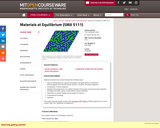
Laws of thermodynamics: general formulation and applications to mechanical, electromagnetic and electrochemical systems, solutions, and phase diagrams. Computation of phase diagrams. Statistical thermodynamics and relation between microscopic and macroscopic properties, including ensembles, gases, crystal lattices, phase transitions. Applications to phase stability and properties of mixtures. Computational modeling. Interfaces.
- Subject:
- Engineering
- Material Type:
- Full Course
- Provider:
- M.I.T.
- Provider Set:
- M.I.T. OpenCourseWare
- Author:
- Ceder, Gerbrand
- Date Added:
- 01/01/2003
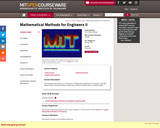
Scientific computing: Fast Fourier Transform, finite differences, finite elements, spectral method, numerical linear algebra. Complex variables and applications. Initial-value problems: stability or chaos in ordinary differential equations, wave equation versus heat equation, conservation laws and shocks, dissipation and dispersion. Optimization: network flows, linear programming. Includes one computational project.
- Subject:
- Engineering
- Material Type:
- Full Course
- Provider:
- M.I.T.
- Provider Set:
- M.I.T. OpenCourseWare
- Author:
- Strang, Gilbert
- Date Added:
- 01/01/2006
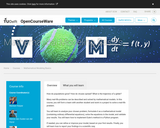
How do populations grow? How do viruses spread? What is the trajectory of a glider?
Many real-life problems can be described and solved by mathematical models. In this course, you will form a team with another student and work in a project to solve a real-life problem.
You will learn to analyze your chosen problem, formulate it as a mathematical model (containing ordinary differential equations), solve the equations in the model, and validate your results. You will learn how to implement Euler’s method in a Python program.
If needed, you can refine or improve your model, based on your first results. Finally, you will learn how to report your findings in a scientific way.
This course is mainly aimed at Bachelor students from Mathematics, Engineering and Science disciplines. However it will suit anyone who would like to learn how mathematical modeling can solve real-world problems.
- Subject:
- Engineering
- Material Type:
- Full Course
- Provider:
- Delft University of Technology
- Provider Set:
- Delft University OpenCourseWare
- Author:
- Prof.dr.ir. C. Vuik
- dr.ir. M. Keijzer
- Date Added:
- 05/22/2019
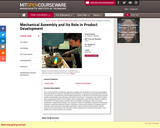
Introduces mechanical and economic models of assemblies and assembly automation on two levels. "Assembly in the small" comprises basic engineering models of rigid and compliant part mating and explains the operation of the Remote Center Compliance. "Assembly in the large" takes a system view of assembly, including the notion of product architecture, feature-based design and computer models of assemblies, analysis of mechanical constraint, assembly sequence analysis, tolerances, system-level design for assembly and JIT methods, and economics of assembly automation. Case studies and current research included. Class exercises and homework include analyses of real assemblies, the mechanics of part mating, and a semester long project.
- Subject:
- Applied Science
- Architecture and Design
- Engineering
- Material Type:
- Full Course
- Provider:
- M.I.T.
- Provider Set:
- M.I.T. OpenCourseWare
- Author:
- Whitney, Daniel
- Date Added:
- 01/01/2004
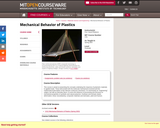
This course is aimed at presenting the concepts underlying the response of polymeric materials to applied loads. These will include both the molecular mechanisms involved and the mathematical description of the relevant continuum mechanics. It is dominantly an "engineering" subject, but with an atomistic flavor. It covers the influence of processing and structure on mechanical properties of synthetic and natural polymers: Hookean and entropic elastic deformation, linear viscoelasticity, composite materials and laminates, yield and fracture.
- Subject:
- Engineering
- Material Type:
- Full Course
- Provider:
- M.I.T.
- Provider Set:
- M.I.T. OpenCourseWare
- Author:
- Roylance, David
- Date Added:
- 01/01/2007
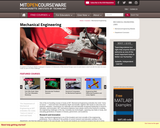
This site contains a broad overview of the mechanical engineering program at the Massachusetts Institute of Technology. It is one of the broadest and most versatile of the engineering professions. The site features lecture notes, assignments, solutions, online textbooks, projects, study groups and exams. This is a nice broad overview of available courses within this program.
- Subject:
- Engineering
- Material Type:
- Full Course
- Provider:
- M.I.T.
- Provider Set:
- M.I.T. OpenCourseWare
- Date Added:
- 01/18/2011
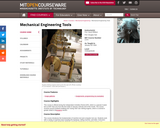
Introduces the fundamentals of machine tool and computer tool use. Students work with a variety of machine tools including the bandsaw, milling machine, and lathe. Instruction given on the use of the Athena network and Athena-based software packages including MATLABĺ¨, MAPLEĺ¨, XESSĺ¨, and CAD. Emphasis on problem solving, not programming or algorithmic development. Assignments are project-oriented relating to mechanical engineering topics. It is recommended that students take this subject in the first IAP after declaring the major in Mechanical Engineering. From the course home page: This course was co-created by Prof. Douglas Hart and Dr. Kevin Otto.
- Subject:
- Engineering
- Material Type:
- Full Course
- Provider:
- M.I.T.
- Provider Set:
- M.I.T. OpenCourseWare
- Author:
- Hart, Douglas
- Date Added:
- 01/01/2004
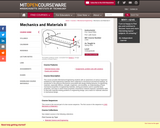
Introduces mechanical behavior of engineering materials, and the use of materials in mechanical design. Emphasizes the fundamentals of mechanical behavior of materials, as well as design with materials. Major topics: elasticity, plasticity, limit analysis, fatigue, fracture, and composites. Materials selection. Laboratory experiments involving projects related to materials in mechanical design. This course provides Mechanical Engineering students with an awareness of various responses exhibited by solid engineering materials when subjected to mechanical and thermal loadings; an introduction to the physical mechanisms associated with design-limiting behavior of engineering materials, especially stiffness, strength, toughness, and durability; an understanding of basic mechanical properties of engineering materials, testing procedures used to quantify these properties, and ways in which these properties characterize material response; quantitative skills to deal with materials-limiting problems in engineering design; and a basis for materials selection in mechanical design.
- Subject:
- Engineering
- Material Type:
- Full Course
- Provider:
- M.I.T.
- Provider Set:
- M.I.T. OpenCourseWare
- Author:
- Anand, Lallit
- Date Added:
- 01/01/2004
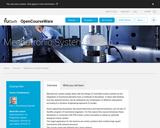
Mechatronic system design deals with the design of controlled motion systems by the integration of functional elements from a multitude of disciplines. It starts with thinking how the required function can be realised by the combination of different subsystems according to a Systems Engineering approach (V-model).
Some supporting disciplines, like power-electronics and electromechanics, are not part of the BSc program of mechanical engineers. For this reason this course introduces these disciplines in connection with PID-motion control principles to realise an optimally designed motion system.
The target application for the lectures are motion systems that combine high speed movements with extreme precision.
The course covers the following four main subjects:
Dynamics of motion systems in the time and frequency domain, including analytical frequency transfer functions that are represented in Bode and Nyquist plots.
Motion control with PID-feedback and model-based feed forward control-principles that effectively deal with the mechanical dynamic anomalies of the plant.
Electromechanical actuators, mainly based on the electromagnetic Lorentz principle. Reluctance force and piezoelectric actuators will be shortly presented to complete the overview.
Power electronics that are used for driving electromagnetic actuators.
The fifth relevant discipline, position measurement systems is dealt with in another course: WB2303, Electronics and measurement.
The most important educational element that will be addressed is the necessary knowledge of the physical phenomena that act on motion systems, to be able to critically judge results obtained with simulation software.
The lectures challenge the capability of students to match simulation models with reality, to translate a real system into a sufficiently simplified dynamic model and use the derived dynamic properties to design a suitable, practically realiseable controller.
This course increases the understanding what a position control system does in reality in terms of virtual mechanical properties like stiffness and damping that are added to the mechanical plant by a closed loop feedback controller.
It is shown how a motion system can be analysed and modelled top-down with approximating (scalar) calculations by hand, giving a sufficient feel of the problem to make valuable concept design decisions in an early stage.
With this method students learn to work more efficiently by starting their design with a quick and dirty global analysis to prove feasibility or direct further detailed modelling in specific problem areas.
- Subject:
- Engineering
- Material Type:
- Full Course
- Provider:
- Delft University of Technology
- Provider Set:
- Delft University OpenCourseWare
- Author:
- Prof ir R.H. Munnig Schmidt
- Date Added:
- 02/23/2016
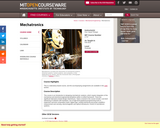
This course is an introduction to designing mechatronic systems, which require integration of the mechanical and electrical engineering disciplines within a unified framework. There are significant laboratory-based design experiences. Topics covered in the course include: Low-level interfacing of software with hardware; use of high-level graphical programming tools to implement real-time computation tasks; digital logic; analog interfacing and power amplifiers; measurement and sensing; electromagnetic and optical transducers; control of mechatronic systems.
- Subject:
- Engineering
- Material Type:
- Full Course
- Provider:
- M.I.T.
- Provider Set:
- M.I.T. OpenCourseWare
- Author:
- Trumper, David L.
- Date Added:
- 01/01/2014